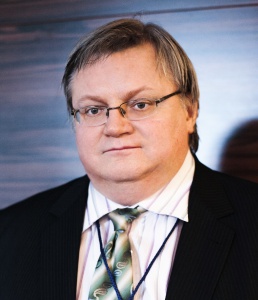Kivshar, Yuri: Difference between revisions
Mahnsoo.choi (talk | contribs) m (Protected "Kivshar, Yuri" ([Edit=⧼protect-level-board⧽] (indefinite) [Move=⧼protect-level-board⧽] (indefinite))) |
Mahnsoo.choi (talk | contribs) No edit summary |
||
| Line 7: | Line 7: | ||
Yuri Kivshar was born in Kharkov, Ukraine. He studied at Kharkov school founded by nobel prize laureate Lev Landau. In 1984 he received Doctor of Philosophy degree and in 1989 aged 30 he became the youngest research fellow of Verkin Institute for Low Temperature Physics and Engineering. | Yuri Kivshar was born in Kharkov, Ukraine. He studied at Kharkov school founded by nobel prize laureate Lev Landau. In 1984 he received Doctor of Philosophy degree and in 1989 aged 30 he became the youngest research fellow of Verkin Institute for Low Temperature Physics and Engineering. | ||
Starting from 1991 he worked as a scientist in USA, Finland, Spain, Germany | Starting from 1991 he worked as a scientist in USA, Finland, Spain, Germany and in 1993 he was invited to the Optical Sciences Centre of Australia and later founded his own laboratory Nonlinear Physics Centre of ANU. | ||
Starting from 2000 Yurii Kivshar worked in different fields of nonlinear optics and carried out research of solitons and metamaterials, nonlinear photonic crystal and composite materials theories. | Starting from 2000 Yurii Kivshar worked in different fields of nonlinear optics and carried out research of solitons and metamaterials, nonlinear photonic crystal and composite materials theories. | ||
He made fundamental impact into self-focusing effect, | He made fundamental impact into self-focusing effect, metamaterials, dielectric nanoantennas, topological insulators, optic signal processing and optic communications. He also discovered series of solitons and described their properties. | ||
In 2010 Yurii Kivshar was invited to St. Petersburg, Russia in terms of government Megagrant program. | In 2010 Yurii Kivshar was invited to St. Petersburg, Russia in terms of government Megagrant program. He became a scientific leader of the International Research Centre for Nanophotonics and Metamaterials of the ITMO University (Saint-Petersburg, Russia). | ||
Professor Kivshar authored and co-authored more than 850 papers. | Professor Kivshar authored and co-authored more than 850 papers. His h-index is 101. His work has generated over 38,000 citations. | ||
==Contributions== | ==Contributions== | ||
* [[Recent advances in the physics and applications of metamaterials]] | * [[Recent advances in the physics and applications of metamaterials]] | ||
Latest revision as of 17:43, 5 September 2017
Yuri S. Kivshar (born in Ukrainian SSR, USSR), Australian Scientist, distinguished professor, head of Nonlinear Physics Centre of The Australian National University (ANU) (Canberra, Australia) and research director of The International Research Centre for Nanophotonics and Metamaterials (St. Petersburg, Russia), Australian Federation Fellow.
Yuri Kivshar was born in Kharkov, Ukraine. He studied at Kharkov school founded by nobel prize laureate Lev Landau. In 1984 he received Doctor of Philosophy degree and in 1989 aged 30 he became the youngest research fellow of Verkin Institute for Low Temperature Physics and Engineering.
Starting from 1991 he worked as a scientist in USA, Finland, Spain, Germany and in 1993 he was invited to the Optical Sciences Centre of Australia and later founded his own laboratory Nonlinear Physics Centre of ANU. Starting from 2000 Yurii Kivshar worked in different fields of nonlinear optics and carried out research of solitons and metamaterials, nonlinear photonic crystal and composite materials theories. He made fundamental impact into self-focusing effect, metamaterials, dielectric nanoantennas, topological insulators, optic signal processing and optic communications. He also discovered series of solitons and described their properties. In 2010 Yurii Kivshar was invited to St. Petersburg, Russia in terms of government Megagrant program. He became a scientific leader of the International Research Centre for Nanophotonics and Metamaterials of the ITMO University (Saint-Petersburg, Russia).
Professor Kivshar authored and co-authored more than 850 papers. His h-index is 101. His work has generated over 38,000 citations.
